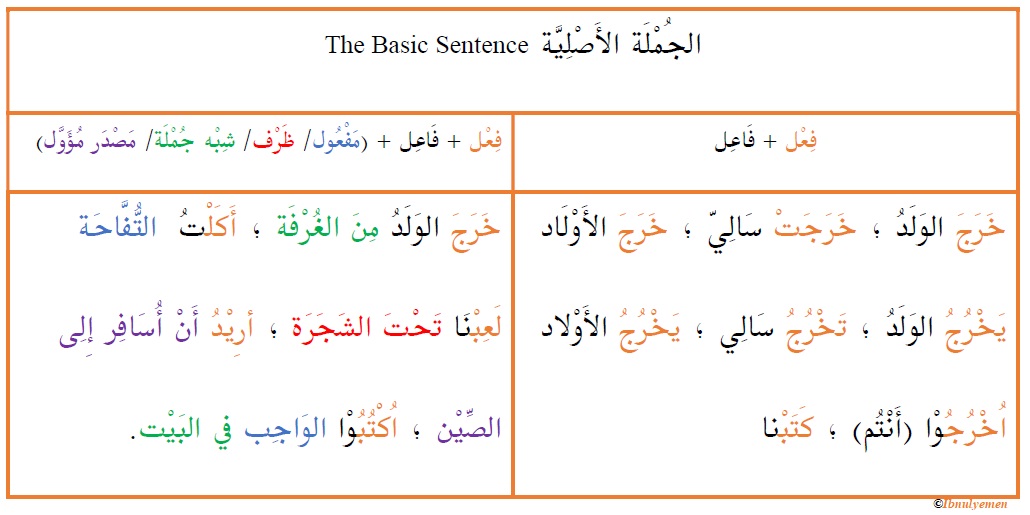Basic Sentence Structure in Arabic (I) Posted by Ibnulyemen اِبْنُ اليَمَن on Sep 14, 2017 in Grammar, Vocabulary
Structurally, there three types of sentences in Arabic: the basic الأَصْلِيَّة, the compound الكُبْرَى, and the clausal الصًّغْرَى (i.e. a clause). The basic, which can be either verbal فِعْلِيَّة or nominal اِسْمِيَّة, has two parts. In the case of the verbal, which is our focus here, the first part is the verb الفِعْل and the second is the subject الفَاعِل. Following are some essentials that you should help you make communicative basic verbal sentences.

The Verbal Sentence:
The verbal sentence always starts with a fully conjugable verb. The verb can be perfective (past), imperfective (present), or imperative (command). Only particles, such as قَدّ qadd ‘maybe, already’, مَا maa ‘not’, لا laa ‘not’, لِـ li- ‘why not, shall we’, among others, can precede the verb. Here are some examples:
| خَرَجَ الوَلَدُ. | kharaja al-waladu | The boy went out. |
| قَدّ خَرَجَتْ سَالِي. | qadd kharajat Sally. | Sally already went out. |
| اُخْرُجُوا! | ukhrujuu! | Go out! |
| لِنَذْهَبْ إِلَى السِّيْنَمَا. | li-nadhhab ilaa assiinama. | Let’s go to the cinema. |
It is an action sentence (i.e. expresses an action). The action is represented by the verb, and this why it should be put at the beginning. If a sentence begins with a noun, then the noun becomes the focus, and the sentence becomes declarative (i.e. states a piece of news of some sort). To illustrate, let’s invert the order of the first two examples above:
خَرَجَ الوَلَدُ (verbal) becomes الوَلَدُ خَرَجَ (declarative, nominal). Likewise, قَدّ خَرَجَتْ سَالِي (verbal) becomes سَالِي قَدّ خَرَجَت (nominal). Hence, the difference between the two is the focus, and subsequently, the type. With respect to meaning, they are almost the same.
Parts of the Verbal Sentence:
For a verbal sentence to be meaningful, it should be composed of two essential parts: the verb الفِعْل and the subject الفَاعِل. The verb by itself does not constitute a complete meaning. If you come across a meaning sentence composed of one word, such as اُكْتُبْ uktub ‘write!’, it means that its subject is implicit (i.e. it not overt, rather it is implied within the verb, known مُسْتَتِر in Arabic).
The remaining parts of the sentence are called مُكَمِّلات complements. They can be an object مَفْعُول, a prepositional phrase شِبْه جُمْلَة, an adverb ظَرْف, among others. They complete the verb or the subject. See the table at the top for illustrations.
The Type of Subject:
The subject of the verb can be اِسْم ظَاهِر ism DHahir ‘an overt noun’ (i.e. proper noun, common noun, interrogative noun and so forth) ضَمِيْر Damiir ‘a pronoun’. The pronoun can be مُتَّصِل muttaSil ‘attached’ or مُسْتَتِر mustatir ‘implicit’. The subject can also be مَصْدَر مُؤَوَّل maSdar m’awwal ‘a noun clause’. For now, we will focus on the first two. Here are some examples:
(a) overt noun subject:
رَقَدَ الوَلَدُ. raqada al-waladu ‘the boy slept.’
تَرْقُصُ البِنْت. tarquSu al-bint ‘the girl dances.’
يَجْرِي الرِّجَال. yajrii ar-rijaal ‘the men run.’
جَرَت النِّسَاء. jarat an-nisaa’ ‘the women ran.’
(b) covert/implicit or attached pronoun subject:
رَقَدَ. raqada ‘he slept.’ [implicit subject]
نَرْقُص. narquS ‘we dance.’ [implicit subject]
جَرِيْـنَا. jarajna ‘we ran.’ [attached subject]
يَجْرَيْـنَ. yajrajna ‘they (f) run.’ [attached subject]
The subject can also be singular, dual or plural. In terms of gender, it can be masculine or feminine, as in:
رَقَدَ الوَلَدُ / الوَلَدَان / الأَوْلَاد. raqada al-waladu / al-waladaan / al-awlaad ‘the boy/two boys/boys slept.’
Verb-subject Agreement:
As for the gender, the verb must agree with the subject. That is, if the subject is feminine in form, the feminine marker, which is ـتْ (ت with sukoon) should be appended to the end of the perfective (past) verb and تَـ (ت with fatHah) should be added to the beginning of the imperfective verb, as in these examples:
سَافَرَتْ سَالِي. saafarat Sally ‘Sally travelled.’
جَلَسَـتْ البِنْتَان. jalasat al-bintan ‘the two girls sat.’
خَرَجَـتْ المُدَرِّسَات. kharajat al-mudarrisaat ‘the teachers (f) went out.’
تــقْفِز البَنَات. taqfiz al-banat ‘the girls jump.’
As to number, if the subject an overt noun, the verb remains singular in form even if the subject is dual, plural, or compound (more than one doer/actor). If the subject is attached or implicit pronoun, the agreement is reflected on the verb through the respective pronominal suffixes, as illustrated above.

Build vocabulary, practice pronunciation, and more with Transparent Language Online. Available anytime, anywhere, on any device.




Comments:
Ihsan Ullah:
Assalam-O-Alaikum Sir,
Hope all is well with you. Sir, I am learning arabic and have completed madina Arabic course. I know some basic arabic, but I am facing many problems in Modal Auxilary verbs in Arabic, Conditional Statments, how to make Afa’al Muta’adee etc…
I like the way you explain things please post something about the topics I mentioned in my text.
Jazakallah khair.
regards,
Ihsan
Ibnulyemen:
@Ihsan Ullah Ahlan Ihsan!
All these will be covered in due course, definitely before the end of 2017. Salaam!
Ihsan Ullah:
Sorry to Forget one….
Please share some Arabic Reading comprehension (Reading passages):simple ones with English translation. It is very urgent.
BaarakAllahu fi Ilmeka, Ameen.
Cheers,
Ihsan
Ibnulyemen:
@Ihsan Ullah this one too, coming soon! all the best!